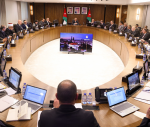You are here
The road ahead for the new government
Jun 27,2018 - Last updated at Jun 27,2018
Prime Minister Omar Razzaz might be the last bullet in Jordan's gun as a man who comes at a desperate time to give hope, supposing he can.
The Harvard professor and technocrat-turned-politician has more charisma and popular approval than any other premier Jordan has seen in decades and enjoys a reputation of a humble, down-to-earth man and a master of communication with the grassroots.
However, this will likely come to an end as the moment of truth is nearing, not when he presents his government's policy statement to the Lower House in July, but when his government presents its version of the income tax law and other economic reforms.
Because the law must meet the requirements of the International Monetary Fund under Jordan's economic correction programme it supervises, the best thing the government can do is to mitigate, but not reverse, the version that has led to popular protests and eventually to the resignation of Hani Mulki and his Cabinet.
Perhaps the most confusing, and misleading, word used in the government's rhetoric is "consensus" when talking about the upcoming tax law. There is no consensus in politics. There is clear vision and determination to implement it.
Although the premier and his team, especially Media Minister Jumana Ghunaimat, have used every platform to tell the public that the new administration has "no magic solutions" to Jordan's economic woes, hinting that painful decisions are around the corner, the message will only get through when the decisions are made. The question to the government is: Are you ready for another showdown with activists emboldened by the "success" of the Fourth Circle protests?
More importantly, do you have an idea how much compromises are you willing to offer to an increasing number of critics and a disillusioned public?
The government is already feeling the heat, with the austerity measures it has announced, related to cutting public spending, being described as "of populist nature, cosmetic and insufficient".
It is a dilemma, indeed. The government, in a couple of months, will be caught between the rock and a hard place: There is an urgent need for unpopular reforms and there is a vicious resistance by so many: MPs who will put on a show of populism to mend fences with their constituencies, professionals who make money and do not want to pay taxes and the other sectors that will be harmed by a reformed taxation system, frustrated middle-class urban youth who can, in a blink of an eye, gather at public squares in Amman and other governorates and grab headlines worldwide.
On the other side of the fence, there are international organisations and lenders who want to see the Kingdom on the track to be able to better manage its public finances and pay back its debts. There are also donor countries that would not accept to see the country remain a rentier state, at their expense.
Amid all that, there is a one and only path for the new government; first to establish its authority and mandate, set its priorities with utter transparency, following a genuine dialogue with stakeholders, and move steadily and firmly on the road of reforms, undistracted by negative criticism, because reluctance and indecisiveness is certainly counterproductive.
The writer is the deputy chief editor of The Jordan Times













